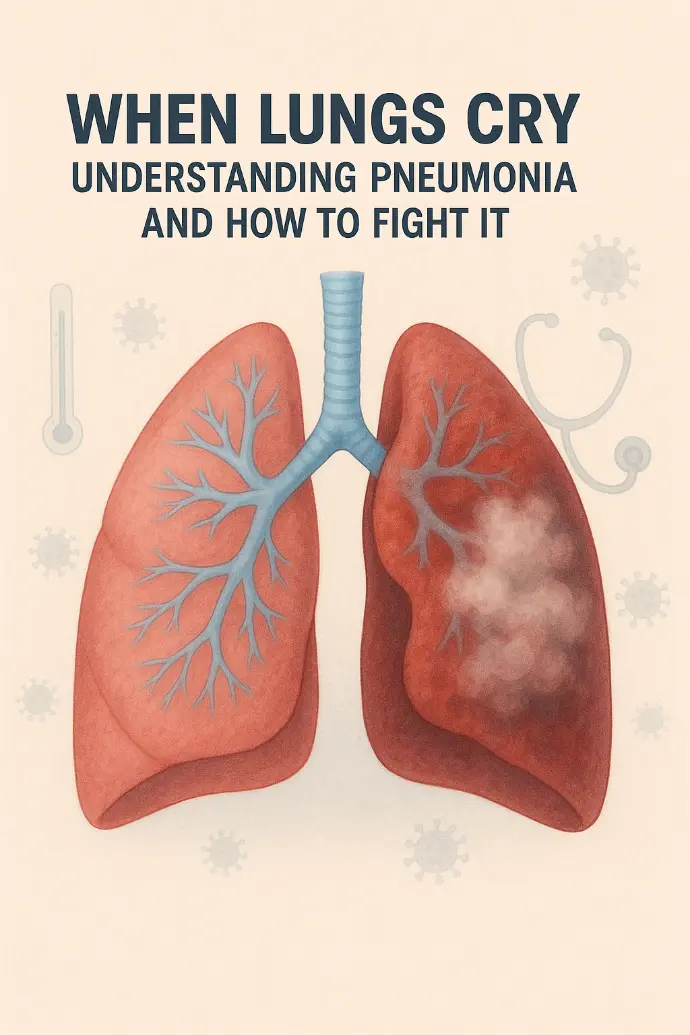
What Is Pneumonia?
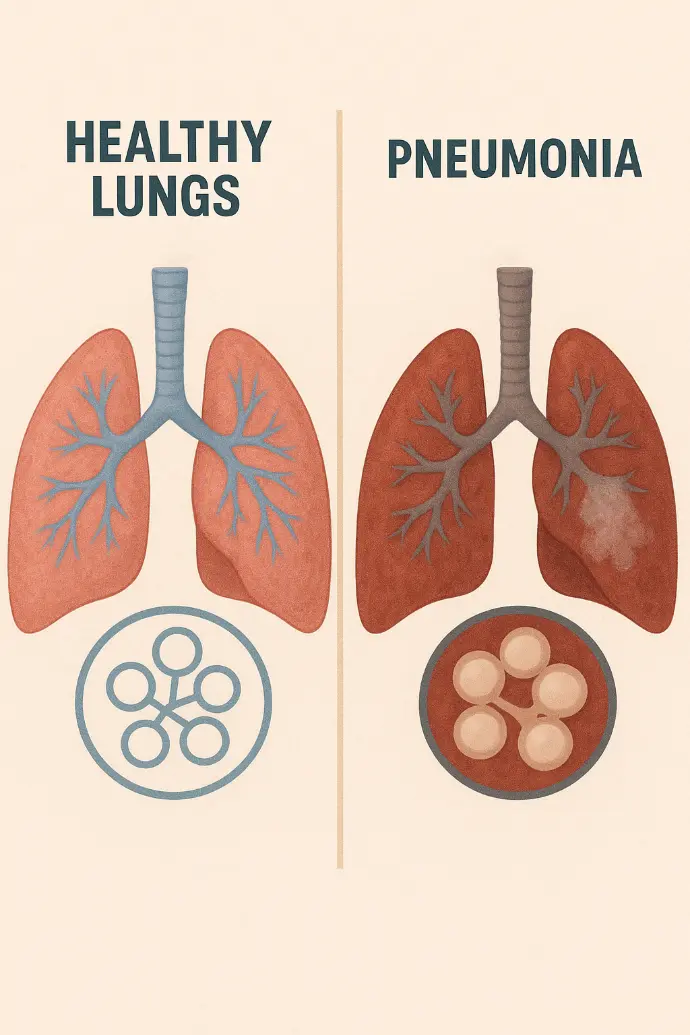
Pneumonia is an infection that causes inflammation in the lungs. Normally, our lungs have small air sacs called alveoli that help us breathe by taking in oxygen and removing carbon dioxide. But when someone has pneumonia, these sacs get filled with fluid or pus, making it difficult to breathe.
Pneumonia can be mild or serious, and in some cases, it can be life-threatening especially for infants, the elderly, or people with weak immune systems.
What Causes Pneumonia?
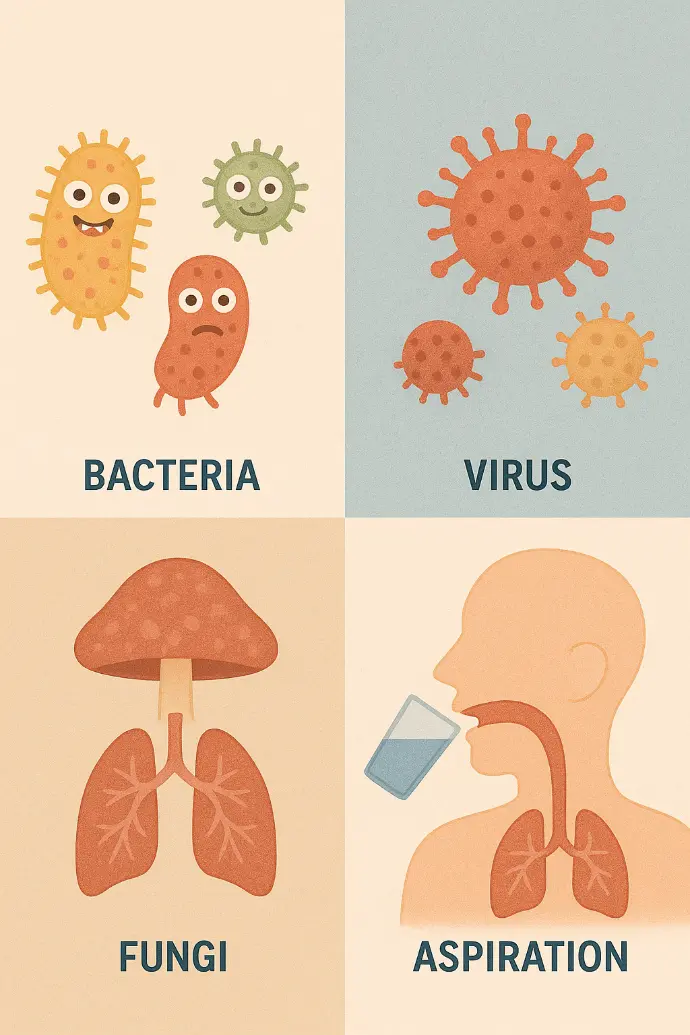
Pneumonia can be caused by different germs, including:
1. Bacteria
The most common cause in adults is Streptococcus pneumoniae. It often starts after a cold or the flu and can infect one or both lungs.
2. Viruses
Viruses like influenza (flu), RSV, and coronavirus (COVID-19) can cause viral pneumonia. Viral pneumonia is often milder but can be severe in some cases.
3. Fungi
Fungal pneumonia is rare but can affect people with weakened immunity. It’s often caused by fungi found in soil or bird droppings.
4. Aspiration
Sometimes, people accidentally breathe food, liquid, or vomit into their lungs. This can cause aspiration pneumonia, especially in older people or those with swallowing difficulties.
Who Is at Risk?
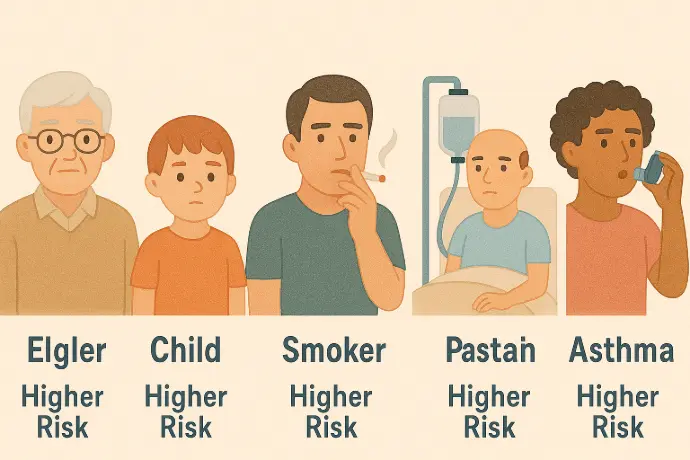
Anyone can get pneumonia, but some people are more likely to develop it:
● Infants and young children
● Adults over 65 years
● People with chronic diseases (like asthma, diabetes, or heart disease)
● People with weakened immune systems
● Smokers
● People who are hospitalized, especially those on ventilators
Common Symptoms of Pneumonia
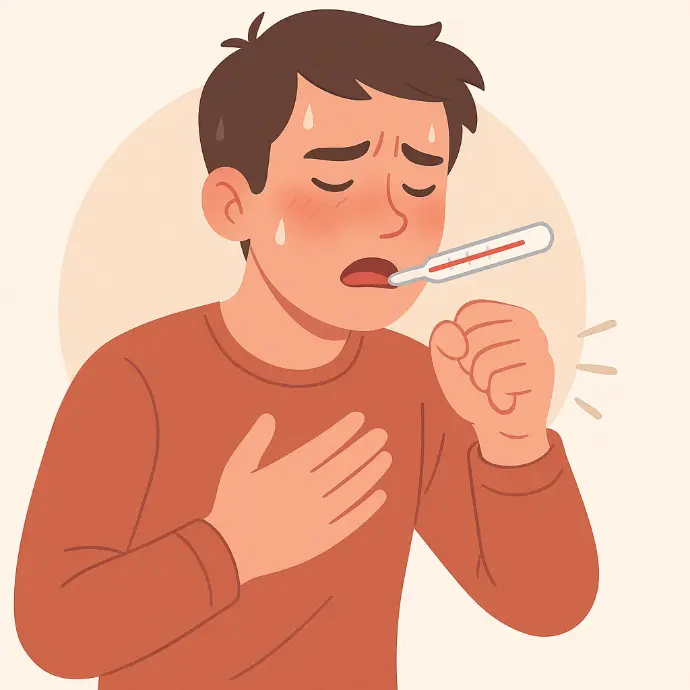
Pneumonia symptoms can range from mild to severe. They may include:
● Cough (with greenish, yellow, or even bloody mucus)
● Fever and chills
● Shortness of breath
● Chest pain (especially when breathing or coughing)
● Fatigue
● Loss of appetite
● Headache
● Sweating
● Confusion (especially in older adults)
In children, signs may include:
● Rapid breathing
● Wheezing
● Poor feeding
● Bluish lips or fingernails (a sign of low oxygen)
How Is Pneumonia Diagnosed?
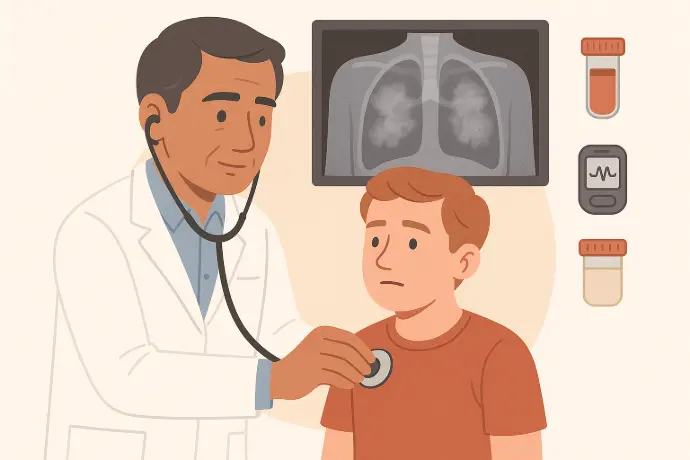
Doctors usually follow these steps:
● Physical Exam
They will listen to your lungs with a stethoscope. Crackling, bubbling, or rumbling sounds may indicate infection.
● Chest X-ray
This shows which part of your lungs is infected.
● Blood Tests
To check for signs of infection.
● Sputum Test
Mucus from your cough is tested to find out what type of germ is causing the problem.
● Pulse Oximeter
This small device measures oxygen levels in your blood.
Treatment Options
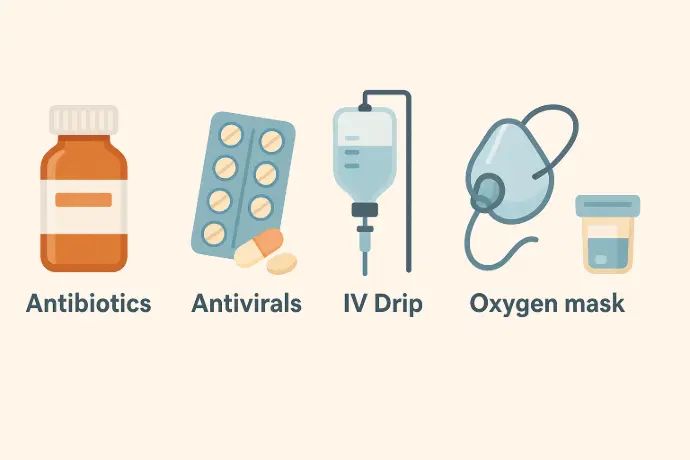
Treatment depends on the cause of pneumonia (bacteria, virus, or fungi), your age, and your overall health.
1. Bacterial Pneumonia
Treated with antibiotics.
Most people start to feel better in 1–3 days, but it’s important to complete the full course of medicine.
2. Viral Pneumonia
Antibiotics won’t help because viruses don’t respond to them.
Doctors may prescribe antiviral medicines (like for flu or COVID-19).
Treatment usually includes rest, fluids, and fever-reducing medications like paracetamol.
3. Fungal Pneumonia
Treated with antifungal medicines.
Often needs longer treatment, especially in people with weak immune systems.
4. Hospital Care
In severe cases, especially with low oxygen levels or other complications, patients may need:
● Oxygen therapy
● IV fluids and antibiotics
● Ventilator support in an ICU
Home Remedies and Self-Care
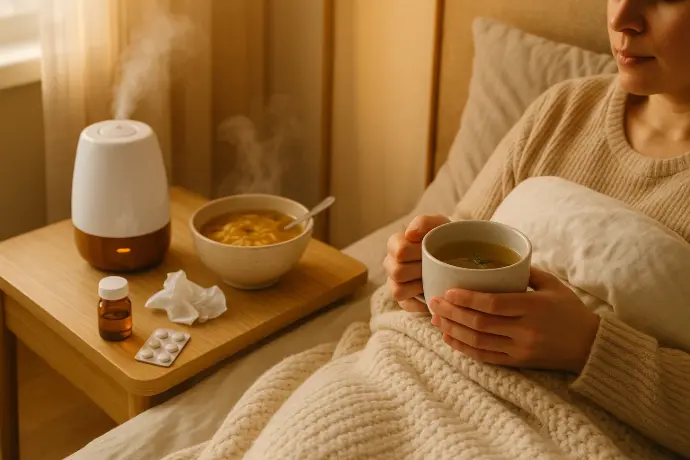
While medical treatment is essential, here are some simple things you can do at home to support your recovery:
● Rest
Your body needs energy to fight infection. Don’t try to do too much too soon.
● Stay Hydrated
Drink water, herbal teas, or broths to loosen mucus and prevent dehydration.
● Take Medications as Prescribed
Complete the full course of antibiotics or antiviral drugs.
● Use a Humidifier
Moist air can help ease coughing and make it easier to breathe.
● Warm Fluids
Soups and warm drinks can soothe a sore throat and help clear mucus.
● Avoid Smoking
Smoking damages the lungs and can slow down healing.
Can Pneumonia Be Prevented?
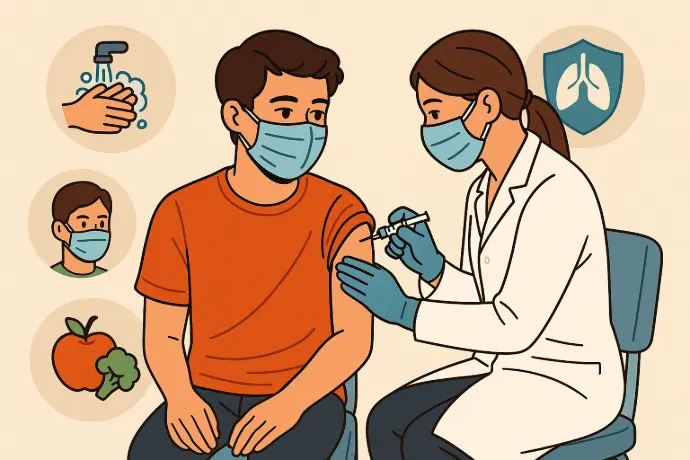
Yes! Prevention is key, especially if you or your loved ones are at higher risk.
● Vaccination
1. Pneumococcal vaccine protects against bacterial pneumonia.
2. Flu shot every year helps prevent viral infections that can lead to pneumonia.
3. COVID-19 vaccine also lowers the risk of viral pneumonia from the virus.
● Good Hygiene
1. Wash your hands often.
2. Use hand sanitizer when soap isn’t available.
3. Avoid touching your face with unwashed hands.
● Avoid Sick People
1. Try to stay away from people who are coughing or sneezing, especially during flu season.
● Boost Your Immune System
1. Eat healthy foods (like fruits, veggies, and whole grains).
2. Stay physically active.
3. Get enough sleep.
Possible Complications
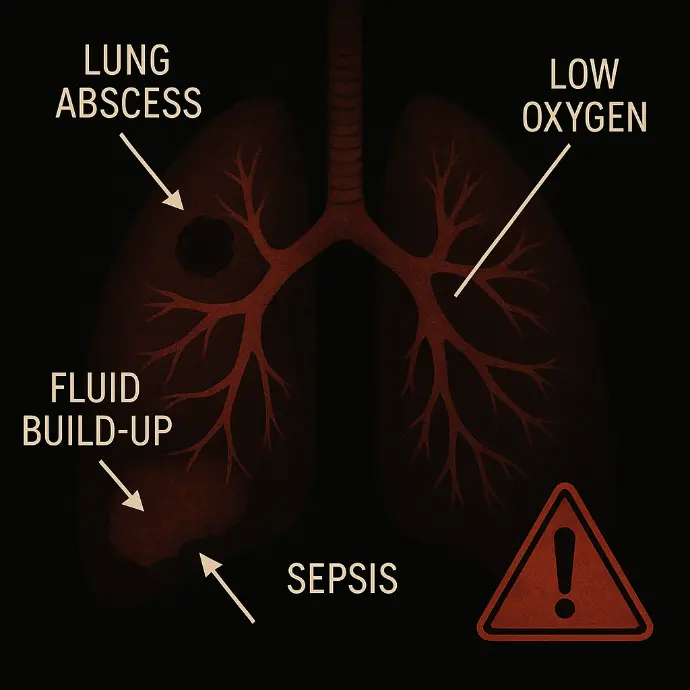
If pneumonia is not treated properly, it can lead to:
● Lung abscess (a collection of pus in the lungs)
● Pleural effusion (fluid buildup around the lungs)
● Sepsis (a dangerous infection that spreads to the bloodstream)
● Respiratory failure (when your lungs can't get enough oxygen)
These are more common in people who are already sick or elderly.
Recovery Time
Most people start feeling better after a week or two, but full recovery can take longer up to a month or more, especially if the pneumonia was severe. Older adults or people with other health problems may take even longer to recover.
When to See a Doctor
See a doctor right away if you experience:
● Trouble breathing
● Chest pain
● A high fever that doesn’t go down
● Blue lips or fingernails
● Confusion or extreme tiredness
● Symptoms that worsen after getting better
Final Thoughts: "Don’t Let Pneumonia Catch You Off Guard"
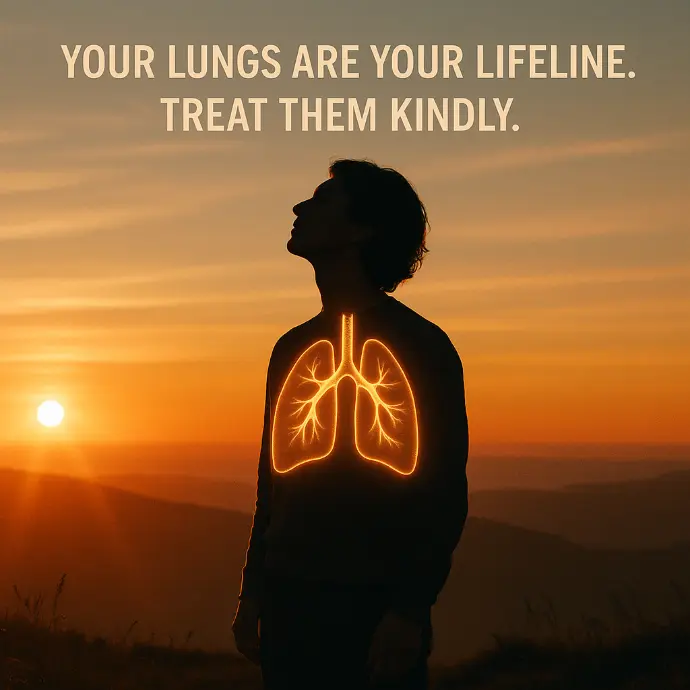
Pneumonia may sound scary, but with the right care, it can be treated and often prevented. Understanding the early symptoms, getting medical help in time, and following simple steps at home can make a big difference.
Remember: Your lungs are your lifeline. Treat them kindly. Vaccinate, stay healthy, and don’t ignore the signs. If you or someone close feels “off” and has a cough or trouble breathing, don’t wait get checked.
Thank You...